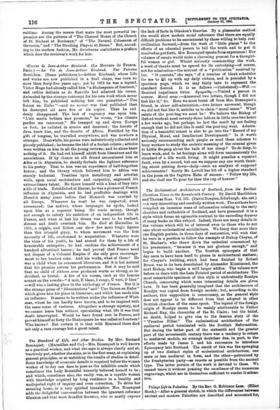The Standard of Life, and other Studies. By Mrs. Bernard
Bostuiquet. (Macmillan and Co.) —Mrs. Etosanquet is well known as a practical worker, and what she says is always clearly and at tra,ctively put, whether she aims, as in the first essay, at explaining general principles, or at unfolding the results of studies in detail. Some knowledge of economic details is required before the woman worker of to-day can dare to pose as the infallible oracle which sometimes the Lady Bountiful honestly believed herself to be ; and which, sometimes also, she really was, as a capable woman with knowledge acquired by long residence in a locality and undisputed right of inquiry and even correction. To drive her meaning home, in a very spirited translation Mrs. Bosanquet adds the delightful conversation between the ignorant reformer Glaukon and that most dreadful Socrates, who so neatly exposes the lack of facts in Glaukon's theories. By a pleasanter method she would show modern social reformers that there are equally difficult problems to be encountered by those willing to help real civilisation forward,—from the work of "little places" to the efforts of an educated person to tell the truth and to get it received as put forth. Mrs. Bosanqnet speaks from experience! Her volumes of essays would make a charming present for a thought- ful woman or girl. Whilst seriously commending the work, a word of thanks must be spared for its embodying—of course, not for admiration—the account of a "publication" received by her. "It consists," she says, 0 of a number of blank schedules for me to fill up with my daily virtues, and is preceded by a specimen page, which we may fairly take to represent the standard desired. It is as follows :—(tabulated)—Will :- Resisted impatience twice. Sympathy :—Visited a person in sorrow. Moral sense :—Answered two letters, though I did not feel like it," etc. Here we must break off from Mrs. Bosanquet's friend, in sheer self-admiration,—two letters answered, though we did not feel like it, entitles us to claim "moral sense." What saints of the post-bag we must be ! We believe the Bishop of Oxford wrote at need seventy-three letters in little over two hours a few weeks ago, but perhaps he lost the merit by not feeling enough that he did not like it until the post-bag went. Admira- tion of a beautiful sunset is also to go into the "Record of my Physical, Moral, and Intellectual Development." Is it worth seriously recommending such people as send these schemes to busy workers to study the esoteric meaning of the counsel given to Little Bo-peep about the tails of her sheep ? To do duty, to learn work, and to let feelings alone will form unconsciously the standard of a life worth living. It might penalise a repeated, fault, even by a record, but can we suppose any one worth think- ing about putting down—daily—such an analysis of supposed achievements ? Surely Mr. Lowell has hit off a higher standard in the poem on the fugitive Hebe of success : "Follow thy life, and she shall sue To pour for thee the cup of honour."


















































 Previous page
Previous page